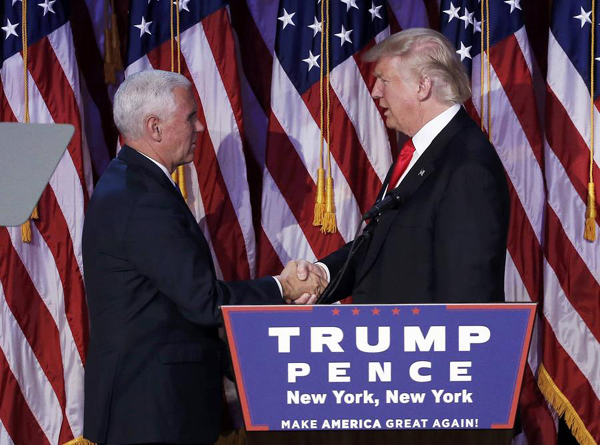The 45th US President
- By George N. Tzogopoulos
 0 Comment(s)
0 Comment(s) Print
Print E-mail China.org.cn, November 13, 2016
E-mail China.org.cn, November 13, 2016
|
|
|
US President-elect Donald Trump greets his running mate Mike Pence during his election night rally in Manhattan, New York, US, November 9, 2016. [Photo/China Daily] |
Donald Trump has been elected the 45th President of the United States and will succeed Barack Obama in January 2017. In line with the tradition of American politics, an eight year administration of the representative of one party is followed by the victory of the nominee of the other. Nevertheless, most Western media have been caught by surprise. As their coverage of the pre-election campaign had been based on data of questionable reliability, they were continuously presenting Hillary Clinton as the predicted winner, even hours before the announcement of the official result.
As opposed to conventional wisdom, the victory of Trump can be hardly considered as shocking for three main reasons. First, polling companies failed to approach the profile of ordinary Trump supporters, who are not necessarily keen on participating in surveys or revealing their voting intentions. Second, the current era is marked by an anti-system or anti-status quo tendency. This means that voters prefer to choose something different than establishment candidates or usual policy options. The result of the U.K. referendum on June 23, which opened the door for Brexit, was indicative. And third, Trump inspired more confidence in Americans - in comparison to Clinton - with his economic policy. The economy plays a catalytic role for the final decision of the electorate in all polls.
Looking towards the future what now matters more is how Trump will behave as the new president of his country. The period until his inauguration in January will be a transition one giving some insights whether his pre-election rhetoric will be followed by deeds. To start with the domestic front, Republicans have retained control of both chambers of Congress but this does not necessarily mean that cooperation between the new U.S. president on one hand and the House of Representatives and the Senate on the other will be harmonious. Disagreements in the Republican Party have been evident for years and uncontrollable in recent months.
Continuing with international challenges, different themes require different answers. Trump has promised to employ a new, friendlier approach vis-à-vis Russia. This promise has generated provisionary enthusiasm in Moscow as reflected in the interpretation of the election result by Russian media. Trump will have to explain how he will diplomatically engage with his Russian counterpart Vladimir Putin.
Trump has also strongly criticized NATO and American support of its traditional allies both in Europe and Asia. Last but not least, he has stigmatized China on economic issues and has said he plans to increase American military presence in South China Sea. It is time for him to clarify the way he will apply his pre-election program by also accommodating China's interests, acknowledging the constraints of economic interdependence and avoiding the risk of a regional conflict.
Above all, Donald Trump is encountered with a reality that can be regarded a double-edged sword in his future course as American president. His atypical rhetoric and character have helped him to be widely considered a "different" politician who might bring real change. Nonetheless, it also facilitates his theoretical association with some radical, right wing politicians. It is not a coincidence that leader of "Front National" Party in France, Marine Le Pen, and founder of the "Party for Freedom" in the Netherlands, Geert Wilders, were among the first to congratulate him. Hence, the most challenging mission for Trump will be perhaps to show to elite and the public that he will be an anti-system president.
George N. Tzogopoulos is a columnist with China.org.cn. For more information please visit:
http://www.china.org.cn/opinion/GeorgeNTzogopoulos.htm
Opinion articles reflect the views of their authors, not necessarily those of China.org.cn.







Go to Forum >>0 Comment(s)